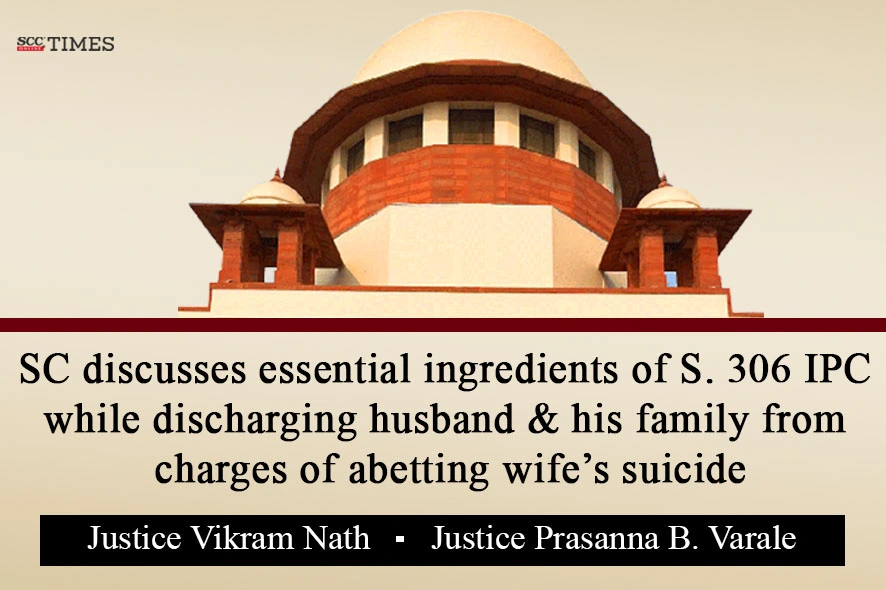Supreme Court: In a criminal appeal against a decision of the Gujarat High Court whereby the revision application filed by the accused persons herein was rejected and the High Court refused to discharge them of the offences punishable under Sections 306, 498-A and 114 of the Penal Code, 1860 (‘IPC’), the Division Bench of Vikram Nath and Prasanna B. Varale, JJ. partly allowed the appeal discharging the accused of charges under Section 306 opining that- mere harassment and such issues between the wife and her husband along with the in-laws did not appear to create a scenario where the deceased-wife was left with no option other than to end her life. The Court held that the essential ingredient of mens rea to instigate the suicide of the deceased persons was absent.
Factual Matrix
FIR was registered against the accused persons at the instance of the deceased’s father alleging that the accused-1 was married to the deceased—wife in the year 2009 and that they were residing with accused nos. 2 and 3 (in-laws). For the first five years of the marriage, no child was born to the couple, hence, allegedly the deceased-wife was subjected to physical and mental harassment and thus returned to her parental home. When she returned to her matrimonial home on being convinced by her parents, a son was born to the deceased in the next few years. The deceased had informed her informant-father that her husband had sold her ornaments, given to her as streedhan during her marriage, and whenever she demanded return of the same, she was physically and mentally harassed. On 18-04-2021, the informant received information that the deceased had committed suicide by hanging herself. It was alleged that it was due to the physical and mental harassment meted out by the accused persons that the deceased was compelled to commit suicide.
The accused persons preferred an application seeking discharge under Section 227 of the Code of Criminal Procedure, 1973 (‘CrPC’) on the ground that, prima facie, the ingredients for the offence of abetment under Section 107 of IPC were not made out against them. The Trial Court dismissed the discharge application holding that in the circumstances of the case, it did not seem just and proper to discharge or acquit any accused person without recording evidence on all the facts alleged. The High Court in the criminal revision petition, passing the impugned order dismissed the same and held that the accused persons failed to bring any material on record to prove that a prima facie case was not made out to frame charges against them.
Analysis and Decision
1. Whether a prima facie case under Section 498-A, IPC was made out against the accused persons?
Referring to U. Suvetha v. State (2009) 6 SCC 757, the Court noted that following ingredients were laid down: i. The woman must be married; ii. She must be subjected to cruelty or harassment; and iii. Such cruelty or harassment must have been done either by husband of the woman or by the relative of her husband. In State of A.P. v. M. Madhusudhan Rao (2008) 15 SCC 582, the Court noted that it was held that not every kind of harassment would amount to ‘cruelty’ within the meaning of the provision. Every case has to be analysed on its individual facts to assess whether the act of the accused persons constitutes cruelty.
Perusing Section 498-A, the Court stated that- “‘cruelty’ simpliciter is not enough to constitute the offence, rather it must be done either with the intention to cause grave injury or to drive her to commit suicide or with the intention to coerce her or her relatives to meet unlawful demands.”
In the matter at hand, the Court noted that the deceased committed suicide after twelve years of marriage and in these years the deceased had informed her family on multiple occasions that she was subjected to physical and mental harassment by the accused persons. Hence, the argument that the deceased had not made a single complaint for cruelty or harassment against the accused persons in the twelve years of marriage cannot be sustained, merely because she did not file any complaint for twelve years does not guarantee that there was no instance of cruelty or harassment. The Court added that the allegations made against the accused persons, with specific, instances stated by the informant and other witnesses prima facie constituted a case under Section 498-A of IPC. On perusal of the FIR, findings of the Investigating Officer, as well as the statements of the deceased’s cousins prima facie indicated that the deceased was subjected to physical as well as mental cruelty by her husband and the in-laws. Additionally, the Court considered the allegations of selling the gold ornaments and subsequent cruelty upon the demand for return made by the deceased. Hence, the Court held that the accused persons could not be discharged for the offence under Section 498-A of IPC and should be charged with and tried for the same
2. Whether a prima facie case under Section 306, IPC was made out against the accused?
Section 306 of IPC provides for punishment for the offence of abetment of suicide. It has to be read with Section 107 of IPC which defines the act of ‘abetment’. The Court explained that for a person to be charged under Section 306, the prosecution must establish that the accused contributed to the act of suicide by the deceased and involvement must satisfy one of the three conditions [the accused instigated or encouraged the individual to commit suicide; conspiring with others to ensure that the act was carried out; or engaging in conduct (or neglecting to act) that directly led to the person taking his/her own life] outlined in Section 107 of IPC.
The Court reiterated-
“For a conviction under Section 306 of the IPC, the presence of clear mens rea—the intention to abet the act—is essential. Mere harassment, by itself, is not sufficient to find an accused guilty of abetting suicide. The element of mens rea cannot simply be presumed or inferred; it must be evident and explicitly discernible.”
The Court pointed out the following essential ingredients to be fulfilled to bring a case under Section 306 of IPC:
i. the abetment;
ii. the intention of the accused to aid or instigate or abet the deceased to commit suicide.
Further, the Court explained that, in cases of death of a wife, the Court must meticulously examine the facts and circumstances of the case, as well as assess the evidence presented. It is necessary to determine whether the cruelty or harassment inflicted on the victim left them with no other option but to end their life. In cases of alleged abetment of suicide, there must be concrete proof of either direct or indirect acts of incitement that led to the suicide. Mere allegations of harassment are insufficient to establish guilt. The Court also reiterated that the act of abetment must be explicitly demonstrated through actions or behaviours of the accused that directly contributed to the victim’s decision to take their own life. Harassment, in itself, does not suffice unless it is accompanied by deliberate acts of incitement or facilitation. Furthermore, the Court elaborated on the proximity of the acts to the time of the suicide, showcasing a clear connection between the accused’s behaviour and the tragic outcome.
The Court also relied on Ude Singh v. State of Haryana, (2019) 17 SCC 301, wherein it was held that to convict an accused under Section 306 of IPC, the intent or mental state to commit the specific crime must be evident when assessing culpability.
In the matter at hand, on careful and close consideration of the facts and the material on record, the Court found no proximate link between the alleged acts, instances of harassment and the deceased’s subsequent death by hanging. The Court said that the alleged incident of selling gold ornaments and subsequent physical and mental harassment, occurred almost a year before the FIR was registered at the instance of the informant. The Court added that the statements of the deceased’s cousins only mentioned instances which occurred a year prior to the death of the deceased. The Court held that such acts, even if true, did not reflect any intention to instigate, incite or provoke the deceased to commit suicide.
Hence, the Court held that the ingredients for the offence under Section 306 of IPC were not made out even on a preliminary analysis of the material on record. Consequently, the Court allowed the appellant’s appeal partly, discharging them of charges under Section 306 of IPC, however the charge under Section 498-A of IPC was upheld.
CASE DETAILS
|
Citation: Appellants : Respondents : |
Advocates who appeared in this case For Petitioner(s): For Respondent(s): |
CORAM :










